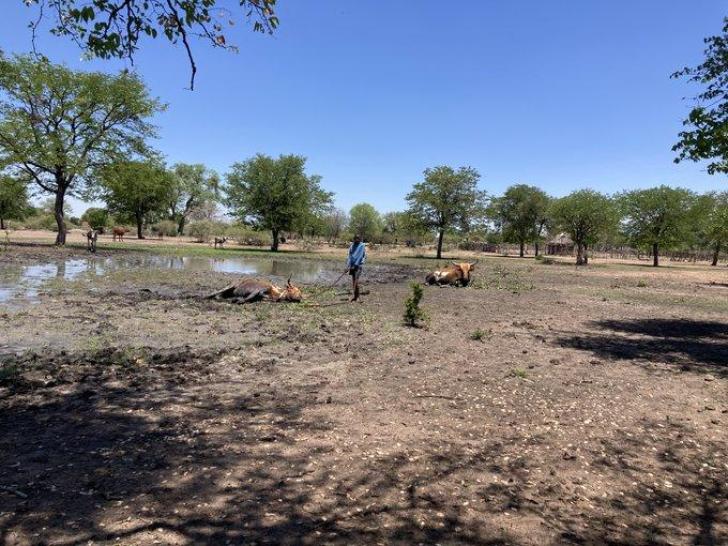News / National
60% of Matebeleland South households do not own cattle
06 Dec 2024 at 06:37hrs |
0 Views

A significant number of households in Matebeleland South province are struggling with livestock ownership, a situation worsened by the persistent drought that has depleted pastures across the region. According to the 2024 Zimbabwe Livelihoods Assessment Committee (ZimLAC) Rural Livelihoods Assessment (RLA) report, nearly 60.1% of households in the province do not own cattle, while 25% lack goats-once a crucial source of wealth for many villagers.
Livestock, particularly cattle and goats, have traditionally been vital to the livelihoods of rural Zimbabweans, with villagers in Matebeleland South well-known for owning large herds. However, the ongoing drought has left pastures scarce and of poor quality, severely affecting livestock numbers. The ZimLAC report highlights that about 92% of communities in Matebeleland South are grappling with inadequate pasture quality, limiting their ability to raise animals.
For those who do own livestock, the most common livestock management practices include deworming (24%) and dipping (38%), but these efforts are not enough to sustain herds under the current conditions. The report calls for intensified government action to improve livestock ownership, pasture quality, and animal health practices to mitigate the growing poverty among rural communities.
It also recommends that the government implement strategies to bolster the animal health industry, including the development of robust drought mitigation measures to secure livestock feed and water. This would aim to reduce livestock mortality and improve the sustainability of animal husbandry in the region. Additionally, the report stresses the need for a policy framework that encourages sustainable livestock production, effective risk management, and the adoption of advanced practices through research and innovation.
In his foreword to the report, ZimLAC chairperson George Kembo noted that the assessment was conducted in the context of the 2023/24 El Niño-induced drought, which has exacerbated food and nutrition insecurity in rural areas. The report sought to provide a clear understanding of the drought's impact on households, contributing to decision-making and the development of timely response programs.
The RLA utilized a multi-pronged approach to data collection, including household interviews, community focus group discussions, and consultations with chiefs and traditional leaders. This comprehensive methodology provided valuable insights into the challenges facing rural households, including issues related to health, nutrition, water, sanitation, food security, and income.
Matebeleland South remains one of the hardest-hit provinces in Zimbabwe, with the El Niño-induced drought causing severe livestock losses and widespread food insecurity. As the region grapples with these challenges, the need for effective, long-term solutions to ensure food security and sustainable livelihoods has never been more urgent.
Livestock, particularly cattle and goats, have traditionally been vital to the livelihoods of rural Zimbabweans, with villagers in Matebeleland South well-known for owning large herds. However, the ongoing drought has left pastures scarce and of poor quality, severely affecting livestock numbers. The ZimLAC report highlights that about 92% of communities in Matebeleland South are grappling with inadequate pasture quality, limiting their ability to raise animals.
For those who do own livestock, the most common livestock management practices include deworming (24%) and dipping (38%), but these efforts are not enough to sustain herds under the current conditions. The report calls for intensified government action to improve livestock ownership, pasture quality, and animal health practices to mitigate the growing poverty among rural communities.
It also recommends that the government implement strategies to bolster the animal health industry, including the development of robust drought mitigation measures to secure livestock feed and water. This would aim to reduce livestock mortality and improve the sustainability of animal husbandry in the region. Additionally, the report stresses the need for a policy framework that encourages sustainable livestock production, effective risk management, and the adoption of advanced practices through research and innovation.
In his foreword to the report, ZimLAC chairperson George Kembo noted that the assessment was conducted in the context of the 2023/24 El Niño-induced drought, which has exacerbated food and nutrition insecurity in rural areas. The report sought to provide a clear understanding of the drought's impact on households, contributing to decision-making and the development of timely response programs.
The RLA utilized a multi-pronged approach to data collection, including household interviews, community focus group discussions, and consultations with chiefs and traditional leaders. This comprehensive methodology provided valuable insights into the challenges facing rural households, including issues related to health, nutrition, water, sanitation, food security, and income.
Matebeleland South remains one of the hardest-hit provinces in Zimbabwe, with the El Niño-induced drought causing severe livestock losses and widespread food insecurity. As the region grapples with these challenges, the need for effective, long-term solutions to ensure food security and sustainable livelihoods has never been more urgent.
Source - newsday
Join the discussion
Loading comments…


































